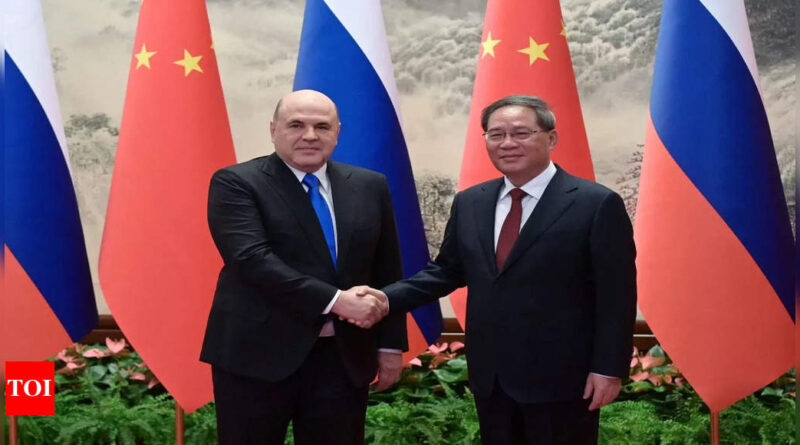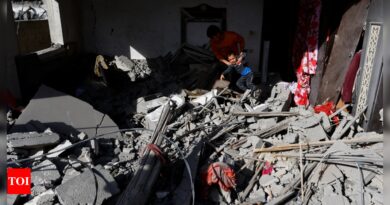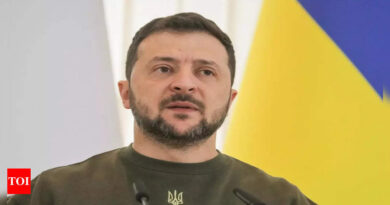On Beijing visit, Russian PM Mishustin says pressure from West is strengthening ties with China – Times of India
BEIJING: Pressure from the West is strengthening Russia’s ties with China, Russian prime minister Mikhail Mishustin said in a meeting with his Chinese counterpart in Beijing Wednesday.
Mishustin’s visit comes as Russia is increasingly turning to China for diplomatic and economic support amid growing isolation over its invasion of Ukraine.
In opening remarks at his meeting Wednesday with Chinese Premier Li Qiang, Mishustin did not mention the 15-month-old war that China, in deference to Moscow, has refused to criticise, focusing instead on economic cooperation between the neighbours that have partnered in challenging the U.S. lead in global affairs.
Relations between the two countries are “at an unprecedented high level,” influenced by the “increased turbulence in the international arena and the pattern of sensational pressure from the collective West,” Mishustin said.
China says it is a neutral party between Russia and Ukraine and wants to help broker an end to the conflict. But it has blamed the West for provoking Moscow and has maintained strong diplomatic and trade ties with Russia in opposition to sanctions against it.
China’s special envoy met with Ukrainian President Volodymyr Zelenskyy and other government officials during talks in Kyiv this month. The visit followed a phone call last month between the Ukrainian leader and his Chinese counterpart Xi Jinping that Zelenskyy described as “long and meaningful” and which marked the first known contact between the two since the Russian invasion began.
Beijing released a peace plan in February but Ukraine’s allies largely dismissed it, insisting that Putin must withdraw his forces. Zelenskyy’s own 10-point peace plan includes a tribunal to prosecute war crimes committed by Russia.
While sidestepping the conflict, Mishustin emphasised Russia’s role as a provider of oil and gas to China and their bonds formed as initial allies among communist nations.
“The peoples of Russia and China cherish their history, rich culture and traditions. We support the further development of our culture, exchanges and communication,” Mishustin said.
Mishustin’s visit comes as Russia is increasingly turning to China for diplomatic and economic support amid growing isolation over its invasion of Ukraine.
In opening remarks at his meeting Wednesday with Chinese Premier Li Qiang, Mishustin did not mention the 15-month-old war that China, in deference to Moscow, has refused to criticise, focusing instead on economic cooperation between the neighbours that have partnered in challenging the U.S. lead in global affairs.
Relations between the two countries are “at an unprecedented high level,” influenced by the “increased turbulence in the international arena and the pattern of sensational pressure from the collective West,” Mishustin said.
China says it is a neutral party between Russia and Ukraine and wants to help broker an end to the conflict. But it has blamed the West for provoking Moscow and has maintained strong diplomatic and trade ties with Russia in opposition to sanctions against it.
China’s special envoy met with Ukrainian President Volodymyr Zelenskyy and other government officials during talks in Kyiv this month. The visit followed a phone call last month between the Ukrainian leader and his Chinese counterpart Xi Jinping that Zelenskyy described as “long and meaningful” and which marked the first known contact between the two since the Russian invasion began.
Beijing released a peace plan in February but Ukraine’s allies largely dismissed it, insisting that Putin must withdraw his forces. Zelenskyy’s own 10-point peace plan includes a tribunal to prosecute war crimes committed by Russia.
While sidestepping the conflict, Mishustin emphasised Russia’s role as a provider of oil and gas to China and their bonds formed as initial allies among communist nations.
“The peoples of Russia and China cherish their history, rich culture and traditions. We support the further development of our culture, exchanges and communication,” Mishustin said.




